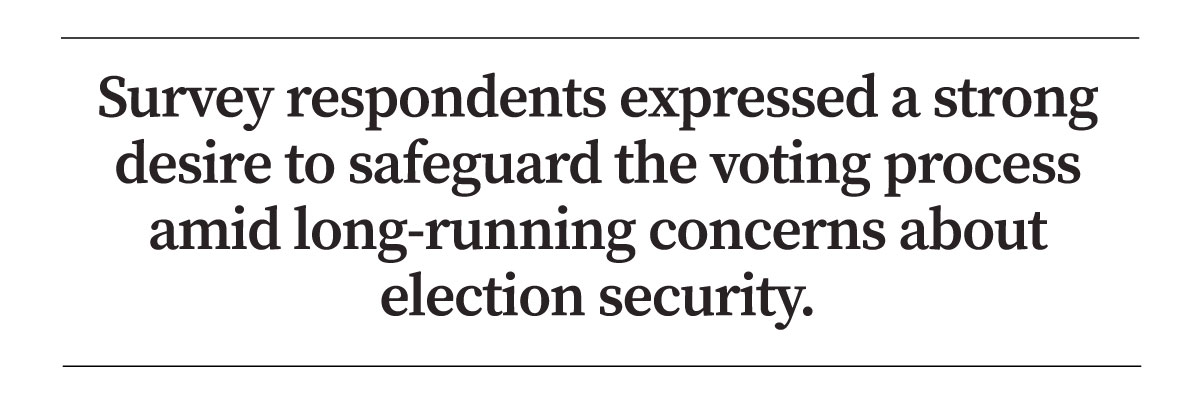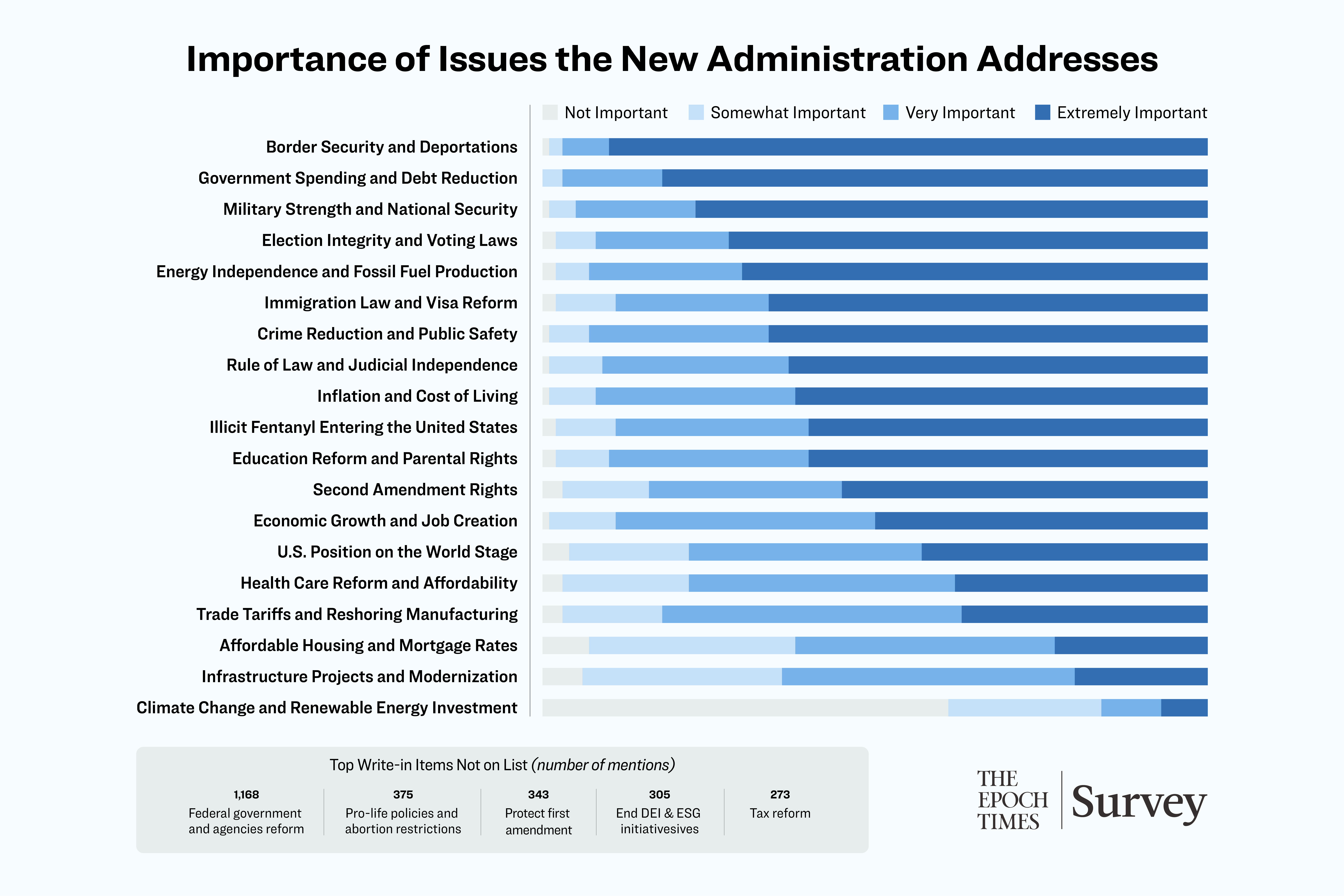Readers of The Epoch Times have identified border security, fiscal responsibility, and national defense as the top priorities for President-elect Donald Trump’s incoming administration.
A poll of 26,740 readers, conducted between Jan. 10–13, points to these issues as key areas of focus, reflecting widespread concern over unchecked immigration, economic instability, and global security threats.
Meanwhile, write-in responses by readers of The Epoch Times highlighted strong support for government reform, coupled with opposition to progressive policies such as diversity, equity, and inclusion (DEI).
Border Security and Deportations
Border security and deportations topped the list, with 90 percent of respondents considering it “extremely important.” This aligns with Trump’s campaign pledge to launch what he has described as the largest deportation operation in American history, set to begin immediately after his inauguration on Jan. 20.
“On my first day back in the Oval Office, I will sign a historic slate of executive orders to close our border to illegal aliens and stop the invasion of our country,” Trump said during a Turning Point USA conference in Phoenix in December 2024.
Besides vowing to deport millions of illegal immigrants, Trump also plans to end birthright citizenship, in which anyone born in the United States is currently given automatic citizenship, including to parents of illegal immigrants.
Fiscal Discipline and Economic Stability
Government spending and debt reduction ranked as the second-highest priority, with 82 percent of respondents highlighting the need for fiscal discipline.
Concerns over the ballooning national debt—now at $36.22 trillion—is a key concern. The president-elect has said he intends to address these issues through measures such as cutting wasteful spending and reforming federal agencies.

U.S. President-elect Donald Trump smiles during Turning Point USA's AmericaFest at the Phoenix Convention Center on December 22, 2024 in Phoenix, Arizona. The annual four day conference geared toward energizing and connecting conservative youth hosts some of the country's leading conservative politicians and activists. (Photo by Rebecca Noble/Getty Images)
To spearhead these efforts, Trump has proposed the creation of the Department of Government Efficiency (DOGE)—with Tesla CEO Elon Musk and entrepreneur Vivek Ramaswamy tapped to lead the initiative. DOGE aims to slash $2 trillion from the federal budget.
“Your money is being wasted,” Musk said at a Trump rally in New York in October 2024, underscoring Trump’s commitment to tackle government inefficiency and cut wasteful spending.
The federal government spent $6.75 trillion in fiscal year 2024—which was $1.83 trillion more than it collected in revenue—pushing the national debt up to $36.22 trillion, according to the Treasury Department.
So far in fiscal year 2025, which runs until the end of September, the government has already spent $1.79 trillion.
The issue of debt sustainability, long a concern of fiscal conservatives, has clearly been on Trump’s radar. In a statement announcing the nomination of Scott Bessent to serve as his Treasury secretary, Trump said his administration would “reinvigorate the private sector, and help curb the unsustainable path of federal debt.”
The nonpartisan Congressional Budget Office (CBO) has warned about the unsustainable trajectory of federal debt, projecting it to climb to a hefty 181 percent of gross domestic product (GDP) by 2053.
If left unchecked, this rising debt is expected to slow economic growth, increase interest payments to foreign creditors, and limit lawmakers’ flexibility to address future fiscal and economic challenges, according to the CBO.
Strengthening National Defense and Securing Elections
Military strength and national security emerged as the third most important priority, with 77 percent of respondents citing it as “extremely important.”
Concerns over global threats from adversaries such as China and Russia have amplified calls for bolstering America’s defense capabilities.

Members of the 1st Armored Brigade Combat Team, 3rd Battalion, 69th Armored Regiment deploy to Germany to reassure NATO allies, deter Russian aggression, and to be prepared to support a range of other requirements in the region in Savannah, Ga., on March 2, 2022. (Melissa Sue Gerrits/Getty Images)
Trump’s proposed “peace through strength” agenda emphasizes modernizing the military, increasing operational readiness, and reinforcing U.S. deterrence on the world stage. On the campaign trail, Trump vowed to reform the U.S. military, criticizing “woke” policies that he says undermine the nation’s warfighting capacity.

Rounding out the top five priorities to Epoch Times readers were election integrity and voting laws (72 percent) followed by energy independence and fossil fuel production (70 percent).
Respondents expressed a strong desire to safeguard the voting process amid long-running concerns about election security. Similarly, energy independence was seen as critical, an objective Trump has identified as key for both economic stability and national security.
On the campaign trail, Trump said repeatedly that his “drill, baby, drill” agenda of ramping up domestic oil and gas production would cut energy prices significantly, help lower costs across the U.S. economy, and provide relief to American households from years of high inflation.
Other Priorities and Write-In Responses
The survey also highlighted other priorities, including crime reduction and public safety (66 percent), immigration law and visa reform (66 percent), and judicial independence (63 percent). Inflation and the cost of living were also cited by 63 percent of respondents as pressing issues.
Lower-ranked topics included affordable housing and mortgage rates (23 percent) and infrastructure modernization (20 percent). Climate change and renewable energy investment, a key priority for progressive politicians, received little support, with only 7 percent rating it as “extremely important” and 61 percent deeming it “not important.”
Respondents were also given the opportunity to suggest their own priorities, and federal government and agency reform emerged as the most common write-in issue, with 1,168 mentions. This appears to reflect dissatisfaction with bureaucratic inefficiencies and a desire for greater government accountability.
Other notable mentions included pro-life policies, protecting First Amendment rights, and opposing DEI initiatives.

The U.S. Capitol in Washington on Jan. 15, 2025. (Madalina Vasiliu/The Epoch Times)



















